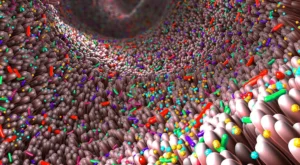By Ross Pelton, RPh, PhD, CCN
Constipation is the most common digestive complaint in the United States, reportedly affecting over 20% of Americans, one-third of elderly adults and over 50% of nursing home residents.i,ii
Can laxatives wreak havoc on your microbiome? Osmotic laxatives such as sold in drug stores are one of the most frequently used classes of laxatives and are also considered to be one of the safest forms of laxatives for children and adults. However, a recent study authored by the highly respected microbiome scientist Dr. Justin Sonnenburg at Stanford contains disturbing news about the use of osmotic laxatives.
Laxatives and Microbiomes
First I want to explain how osmotic laxatives work and then I will follow with a summary of the findings from Dr. Sonnenburg’s study.
Osmotic laxatives contain a substance called polyethelene glycol (PEG). PEG consists of small particles, which are not absorbed from the GI tract. However the PEG particles attract a significant amount of water into the GI tract. This infusion of water into the intestinal tract flushes out the system resulting in a bowel movement. Although osmotic laxatives with PEG are generally promoted as safe for use in children and adults, Dr. Sonnenburg’s new study reports that PEG-containing laxatives harm your microbiome.
Dr. Sonnenbrug’s study was conducted In mice. However, the gastrointestinal tract of mice and humans are very similar in physiology and anatomy, which explains why mouse models are increasingly being used in biomedical studies related to the human GI tract and microbiome.iii
The title of Dr. Sonnenburg’s study is: Transient Osmotic Perturbation Causes Long-Term Alternation to the gut Microbiota.iv Here is a summary of the findings from this study:
- Mild osmotic diarrhea leads to long-term changes in gut microbiota membership
- Important strains of probiotic bacteria undergo extinction unless reintroduced
- The mucus barrier is transiently disrupted during osmotic diarrhea
- Mild osmotic diarrhea induces host innate and adaptive immune responses
Maintaining a healthy microbiome is one of the most critical aspects of good health. Here is the important message I gleaned from Dr. Sonnenburg’s study. Any time an individual does something to unset the ecosystem of his or her intestinal tract, there are likely to be negative consequences to the microbiome. Always be mindful of your microbiome and treat your trillions of probiotic bacteria as though your life depends on it, because it does…!!!






